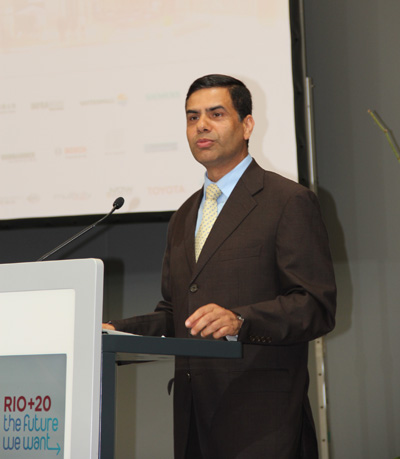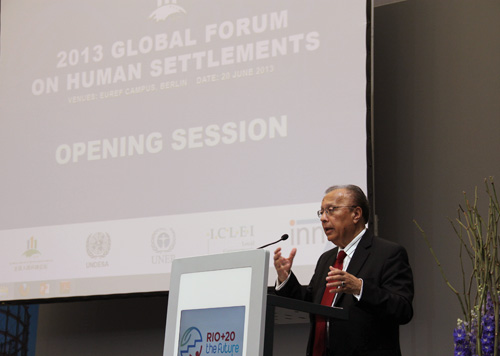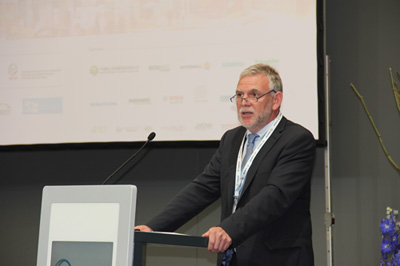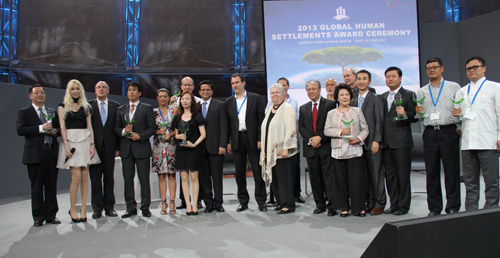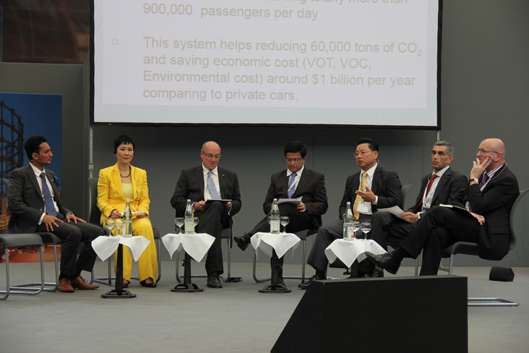Berlin High-level Dialogue on Implementing Rio+20
Decisions on Sustainable Cities and Urban Transport &
2013 Global Forum on Human Settlements
19 - 21 Jun 2013
Berlin, Germany
Taking place in Rio de Janeiro, Brazil on 13-22 June 2012, the United Nations Conference on Sustainable Development (Rio+20), along with its associated events drew together the heads of State and Government from over 100 countries and some 50 thousand delegates from around the world. Rio+20 established the universal principle of sustainable development, and adopted the outcome document The Future We Want to serve as a guideline for implementation in the decades to come.
Right on the anniversary of Rio+20, marking one of the most important events in the post-Rio+20 era, Berlin High-Level Dialogue on Implementing Rio+20 Decisions on Sustainable Cities and Transport & 2013 Global Forum on Human Settlements grandly kicked off at EUREF Campus, Berlin, Germany, on 19-21 June 2013. It was co-organized by the United Nations Department of Economic and Social Affairs (UNDESA), United Nations Human Settlements Programme (UN-HABITAT), United Nations Environment Programme (UNEP), Global Forum on Human Settlements (GFHS), Local Governments for Sustainability(ICLEI), German Federal Environment Agency-Umweltbundesamt (UBA), Innovation Center for Mobility and Societal Change (InnoZ), etc. The conference extended its relevant agenda centering around the theme of “Implementing Rio+20 Decisions and Achieving the Future We Want”.
We are now living in an era of unprecedented, rapid and irreversible urbanization. Building sustainable cities and creating sustainable transport systems become pivotal in eliminating poverty, developing green economy and achieving sustainable development. Rio+20 called on both national and local governments to support the development of sustainable transport systems, including energy efficient, multimodal transport systems, notably public mass transportation systems, clean fuels and clean vehicles, as well as improved transportation systems in rural areas (Par. 133 of the outcome document The Future We Want). Rio+20 further emphasized the importance of increasing the number of metropolitan regions, cities and towns that are implementing policies for sustainable urban planning and design in order to respond effectively to the expected growth of urban populations in coming decades. Rio+20 also recognized the important role of municipal governments in setting a vision for sustainable cities, from the initiation of city planning through to revitalization of older cities and neighborhoods, including by adopting energy efficiency programmes in building management and developing sustainable locally appropriate transport systems. (Par. 136 of the outcome document The Future We Want).
Although the common goals of improving quality of people’s life and achieving urban sustainable development are clearly set, yet the actual implementation and realization of “The Future We Want” remain a daunting task. How can Rio+20 decisions be best implemented? Each country and each city will have to draw up an appropriate plan for sustainable development in line with its own needs and get all the stakeholders involved. A greater degree of international information exchange and cooperation will be essential to meet the challenges ahead.
Thus, the Berlin High-Level Dialogue on Implementing Rio+20 Decisions on Sustainable Cities and Transport and 2013 Global Forum on Human Settlements is aiming to provide a dialogue platform for stakeholders, policy-makers, experts and representatives of private sectors from relevant countries, regions and even from all across the world, to make in-depth explorations and share policies, initiatives and successful experiences in promoting the development of sustainable cities and transport. The best practices are identified and disseminated to facilitate capacity building through international exchanges, particularly among developing countries to push for a global action for sustainable development and implement the joint commitments we made at Rio+20. Meanwhile, the conference contributed positively to the new Sustainable Development Goals (SDGs) to be set up by the United Nations in 2015 and the convening of the first session of High-Level Political Forum for Sustainable Development.
The conference attracted nearly 400 delegates from 40 countries and international organizations. Major guests include: Gyan Acharya, Under-Secretary-General and High Representative of the United Nations; Jochen Flasbarth, President of German Federal Environment Agency (UBA); Ambassador Anwarul K. Chowdhury, Chairman of Global Forum on Human Settlements (GFHS) and former Under-Secretary-General and High Representative of the UN; Almuth Hartwig-Tiedt, Secrtary of State of the Ministry of Environment, Health and Consumer Protection of the Federal State of Brandenburg; ministerial officials from Germany, India, Shri Lanka, Colombia, Kenya and other relevant countries; officials from the United Nations, the World Bank and other international organizations; and more than 60 city mayors and governmental senior representatives from Bangkok Thailand, Rio de Janeiro Brazil, Mumbai India, Lviv Ukraine, Santa Monica USA, Amman Jordan and some other cities in different continents, as well as representatives of renowned experts and scholars, international organizations and multinational enterprises, and multinational corporations such as Siemens, Schneider, Bosch, Daimler, and Toyota. A delegation consisting of over 50 government officials and business representatives, experts and scholars from China were also invited to attend the conference.
At the Dialogue’s opening ceremony, Gyan Acharya, UN Under-Secretary-General first conveyed Secretary-General Ban Ki-moon’s congratulatory statement for the conference: “I firmly believe that green energy and sustainable transport will improve the quality of life and environment, will create jobs and open up markets. Thus they will help realize the Millennium Development Goals, promote universal values, as well as protect our planet.” Mr. Gyan Acharya pointed out that Rio + 20 ensured a long-term cooperation for us to achieve sustainable development in all countries, for which cities play a central part. We need to adopt unitary and integrative planning, closely connecting urban and rural areas, integrating the elderly, young people, including the marginalized groups in the programmme. Transport arrangements should protect the vulnerable groups, prevent private cars from occupying too much space and control the increase of CO2 emissions. We need to build a transportation system which is affordable for ordinary citizens and ensure citizens to commute without using private cars. We need to build stable global partnerships to exchange experience with each other, to implement and improve the technology. Berlin is an appropriate place for dialogue. Our decisions today will make a difference for the future.
The 2013 Global Forum on Human Settlements is the most highlighted big-pictures of the conference. The Opening Ceremony was hosted by Ambassador Anwarul K. Chowdhury, Chairman of Global Forum on Human Settlements (GFHS) and former Under-Secretary-General and High Representative of the UN; Lu Haifeng Secretary-General of Global Forum on Human Settlements; Nikhil Seth, Director of the Division for Sustainable Development, UNDESA; Arab Hoballah, Chief of the Sustainable Consumption and Production Branch in the Division of Technology, Industry and Economics of UNEP; Wolfgang Teubner, Managing Director of International Council for Local Environmental Initiatives (ICLEI) European Secretariat. They delivered speeches respectively on behalf of each of the co-organizers. They congratulated on the successful debut of the Global Forum on Human Settlements annual conference in Europe, and spoke highly of GFHS’s contributions to disseminating and implementing Rio + 20 decisions, selecting and promoting global best practices and supporting the UN agenda. They brought forward their suggestions on strengthening the partnerships between Chinese and European cities, further deepening the dissemination of Rio + 20 decisions, facilitating more cities and enterprises to get into action. The Forum themed on “Sustainable Urban Development and Ecological Cities Initiatives and Best Practices”, and Arab Hoballah, Chief of the Sustainable Consumption and Production Branch in the Division of Technology, Industry and Economics of UNEP took the lead to share the “Global Initiative for Resources Efficient Cities” launched by the UNEP. The objective of the initiative is to enhance the quality of life in urban areas, in particular in rapidly growing cities in developing countries, while minimizing resource extraction, energy consumption and waste generation, while safeguarding ecosystem services. It encourages global cities to get the active participation, and UNEP and its partners will assist them by providing technical and policy support. Following that, city mayors, business leaders and famous experts from Europe, America and Asia also spoke enthusiastically, sharing their experiences and programmes of implementing Rio + 20 decisions and creating best practices. Speakers were promptly interacted with the audience and the delegates were largely inspired, and reached a significant consensus.
At the conference, officials from Berlin Municipal Government and Brandenburg State Government introduced the experience on the city transportation and best practices of electric mobility in Berlin. Among many things, they emphasized on the good connection between multimodal transportations by using the One-Card; they made remarkable achievements by integrating city planning, transportation etc into a comprehensive agency of municipal development department for unified management while Berlin City and Brandenburg State jointly established a planning department for unified deployment, which is a pioneering practice in Germany; they attaches great importance to energy transformation and smart grid building; they set up the electric transport bureau (eMO) to vigorously develop electric transportation, build electric travel demonstration centers for further encouragement, construct charging facilities in a large scale, and develop electric bicycle project etc.; currently in Berlin, 45% of the households has deprived of private cars, two-thirds of the citizens choose green mobility, and the city has 1200 electric vehicles with 220 public charging stations at their service; the goal for transport modes in Berlin by 2025: private cars 25%, walking 28%, cycling 18% and public transportation 29% . Another best practice that gained the participants’ commendation was from China. Li Xiaolin, President of China Power New Energy Development Company Limited and her international cooperation team shared their advanced concept, technology and the international cooperation model for the “Project of Green and Healthy City” located in Hainan province. Also, delegates from Mission Hills Group, China introduced how they implemented the Rio + 20 decisions by building the Mission Hills Resort, and they shared the successful experience of building the world-class low-carbon ecological scenic spot, and the economic and social benefits it generated, --that duly caused wide concern too. Additionally two dialogues were held at the conference. The first one proceeded with the theme “Conducting Multilateral Cooperation for Urban Development and Transportation Planning,Achieve Win-Win Situations”, 7 ministers, majors and business leaders from several developing countries shed fresh light on the topic. The second is centered on the topic of “Marching toward Low-Carbon Cities”, and it was carried out by city mayors and representatives from such developed countries as the USA, Japan and Germany. The points of view in their dialogue were fascinatingly novel and strategically advantageous, and the cases they presented were forward-looking and operable. Their talks were full of positive enlightenment and incentive effect. The conference achieved fruitful results, and they will be submitted to the United Nations to serve for reference of setting up the Post-2015 Sustainable Development Goals. Relevant information will be publicized on the website of the United Nations and the website of GFHS.
Among many of the conference’s initiatives and practices, the International Green Modern City (IGMC) project launched by GFHS attracted a lot of attention from the delegates. As a project registered at the UN Secretariat and an important commitment to Rio+20, IGMC is supported by UNEP and many international organizations and associations, it has become a pilot project for low carbon city building with high starting point, mainly featuring with the combination of low-carbon city building with green economy and with culture. The IGMC Project will be initially implemented in China and other developing countries. IGMC is a new exploration matching up with the United Nations and the whole world’s response to climate change, sustainable land development and new-type urbanization. It is a robust engine to rapidly drive the development of low-carbon industry, a wide-ranging stage to pass on the culture of human settlements. The IGMC Standards and Indicators are compiled by some 50 experts from China and abroad, which include 12 principles and corresponding strategies and measures with an authentication rating system to guide IGMC planning and construction. IGMC pilot project will first be put into practice in China to make true a practical action for implementing Rio+20 decisions and guiding the new-type urbanization.
Coming off on 20th June night, the Medal Presentation Ceremony of 2013 Global Human Settlements Award was also eye-catching. The Global Human Settlements Award was sponsored by GFHS has been successfully held in China, USA and Brazil for consecutive seven times to date, and its winners found themselves all around the world. This year’s award presentation is especially supported by the United Nations Department of Economic and Social Affairs (UNDESA), United Nations Environment Programme (UNEP), which empowers the award to be more influential. After half a year’s rigorous appraisal and intense competition, a group of outstanding models worldwide obtained the crown. Among them, Oeiras Portugal, Changsha China, Yokohama Japan won the laurel of “Global Green City” and Zhouzhuang Town from China received the honor of “Global Green Town”. Also, Mission Hills Resort from China (Shenzhen, Haikou, Dongguan), Low-Carbon Resort City Project from Santa Monica California USA won the honor of “Global Low-Carbon and Ecological Scenic Spot”. And Yulingwan residential area from China COFCO Group, Central China’s Guozhai Garden, and Chengdu Mandarin Oriental and Armani Cultural Complex Project won the title of “Global Human Settlements Model Building (Residential)” for their outstanding performance. Moreover, the German Black Forest Biomass Cooperatives was praised as “Best Practice of Low-Carbon Bioenergy Project”. The Berlin EUREF Campus in Germany, which is reputable for being a “Pioneer of Electric Mobility and Smart City of Tomorrow”, was updated as “Best Practice of Global Urban Renewal”. Andres Duany, a leading figure in the US New Urbanism won the prize of “Global Human Settlements Outstanding Contribution Award” for the historic status and influence among the sustainable urban concepts and planning practices. Ambassador Anwarul K. Chowdhury, Chairman of Global Forum on Human Settlements (GFHS) and former Under-Secretary-General and High Representative of the UN,Nikhil Seth, Director of the Division for Sustainable Development, UNDESA; and Arab Hoballah, Chief of the Sustainable Consumption and Production Branch in the Division of Technology, UNEP enthusiastically presented the prize medals to the winners, which immediately created a warm and festive atmosphere and waves of applause. These winners turned the initiative of “Building Sustainable Human Settlements” into reality. They are the best practices of implementing Rio+20 decisions, motivating more people to exert continual efforts for the Future We Want.
During the conference, the sponsors organized the delegates and guests to make a field visit to Berlin Electronic Highway Demo Track, City Center Electric Vehicles Sharing Facilities and Services, and Berlin Model Homes of Energy Efficiency and some more projects. In addition, as an extension of the activity, GFHS Board of Directors will organize part of the Chinese delegates to visit HafenCity Hamburg, Copenhagen and other green cities in Europe and made thematic exchanges. HafenCity Hamburg, and Copenhagen Municipal Science and Technology and Environment Department will hospitably receive the visiting guests, and hold seminars to talk about city reform, climate change mitigation and green mobility and they will make arrangements to visit their famous projects. This activity will exert positive effect on facilitating the guests to expand their horizon, enhance the knowledge of capacity building, and strengthening the exchanges and cooperation between China and Europe.
The benefit of convening the conference is to motivate and encourage more countries, more enterprises, more organizations and the public to actively participate in the practice of building sustainable cities and achieving sustainable transport systems, to inject vigor for the realization of the livable city, smooth transport system, clear water and blue sky, to provide positive energy for the realization of each one's dream for a livable home and the healthy growth of future generations.






